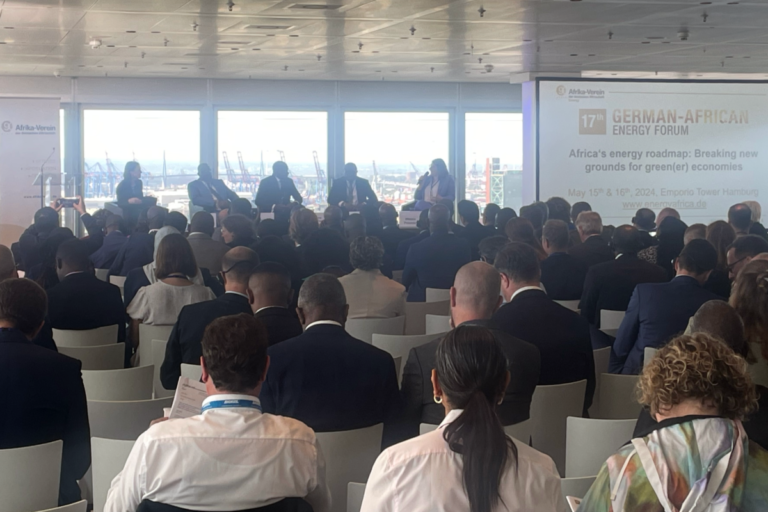The 17th edition of the German-African Energy Forum in Hamburg attracted more than 300 participants from more than 30 countries this week. The continent’s green energy transition and its financing were among the topics on the agenda.
More than 300 participants from more than 30 countries took part in the 17th edition of the German-African Energy Forum, which was held in Hamburg on May 16 and 17.
Wiebke Polomka, senior manager of Southern Africa at Afrika-Verein der deutschen Wirtschaft, which organized the forum, said pv magazine that German companies have the technology, knowledge and experience to support Africa’s transition.
“I think we can go even further from here. We need to encourage even more companies to take a look at Africa as it has huge potential for renewable energy and everyone is looking for partners,” she added.
This year’s theme – “Africa’s energy roadmap: breaking new ground for green(er) economies” – would point out that the continent’s transition to green energy has been at the forefront of many conversations. In an introductory video call, Dr. Amani Abou-Zeid, Commissioner for Infrastructure, Energy, ICT and Tourism of the African Union, said maximizing the use of sustainable energy in Africa is a “must”. She set goals of 800 GW of renewables by 2040, including a 20-fold increase in solar power.
Nthato Minyuku, head of government affairs for Africa at Siemens Energy, told attendees that African countries need time, space and financing for the energy transition. She added that “radical solutions are not the answer to radical problems.” Several speakers said that each country will have different paths and different paces towards energy transition. For some, that will include the continued use of gas as a transition energy source.
Financing problems
In a session discussing the roadmap to greener industrialization, panellists said African countries need to “be more honest with themselves” and introduce incentives and frameworks to create an enabling environment for foreign investors. Ezekiel Adesina, Executive Secretary of the African Energy Study Group, Nigeria, called for international cooperation across the continent. His calls were echoed by Senegalese Energy Minister Birame Souléye Diop, who said neighboring countries do not want to compete with each other and should rather support each other.
Participants said energy projects in Africa could be up to two to three times more expensive than comparable projects in advanced economies, sparking discussions about whether financing instruments should be adjusted or reconsidered. While the forum made clear that German government funding will continue to play a role, responsibility was placed on the private sector.
Birgit Pickel, director general for Africa at the German Federal Ministry for Economic Cooperation and Development (BMZ), said the private sector “must do the work.” She explained that the ministry aims to attract more investments. BMZ currently has 33 bilateral partnerships across Africa, tailored to each country, with a focus on providing the cheapest renewables as energy alternatives.
The panelists noted the investment risks, but emphasized the direct correlation between risks and opportunities. During a session on financing the energy transition, investors were urged to partner with local companies once projects start in Africa as this reduces the risks of projects while putting less pressure on imports and in turn less dependence on the dollar.
Focus on hydrogen
Throughout the forum, hydrogen was never far from the discussion. In one session entirely dedicated to the technology, heralding it as the ‘energy of the future’, the focus was on harnessing green hydrogen for local use in African industries. In particular, Sven Schuppener, associate professor at UNIDO Austria, provided advice to African countries wanting to develop the technology.
“It may sound counterintuitive at first, but for most countries it makes sense to start small,” Schuppener said, adding that donor funding is often available for small-scale projects.
Markhus Thill, Africa region president at Robert Bosch, agreed, adding that hydrogen projects aimed at benefiting the local sector will in turn boost industrialization and job creation.
And while Germany’s long-term goal of exporting hydrogen from Africa to Europe was mentioned – particularly the potential to do so from North African countries where pipelines already exist – several attendees shared the view that African countries should work towards universal access to electricity and less dependence. on imports, before considering additional exports.
German companies can be sure that African countries are ready for investments. Multiple speakers at different sessions said there were representatives in the room ready to start the conversation.
Adesina often urged “risk-averse” German investors to visit the African countries in which they want to invest. He said Chinese companies are currently occupying the space, while African companies want to sign what is on the table.
Polomka told pv magazine that connecting people was one of the forum’s main objectives.
“We hope that new partnerships will emerge and new products will emerge that will have an impact on the continent and on the local community in which they are building the project,” she said. “So they start the conversation here and continue after the forum and maybe come back next year and tell us, ‘I met the right partner at your forum and this is the project we developed’.”
This content is copyrighted and may not be reused. If you would like to collaborate with us and reuse some of our content, please contact: editors@pv-magazine.com.


